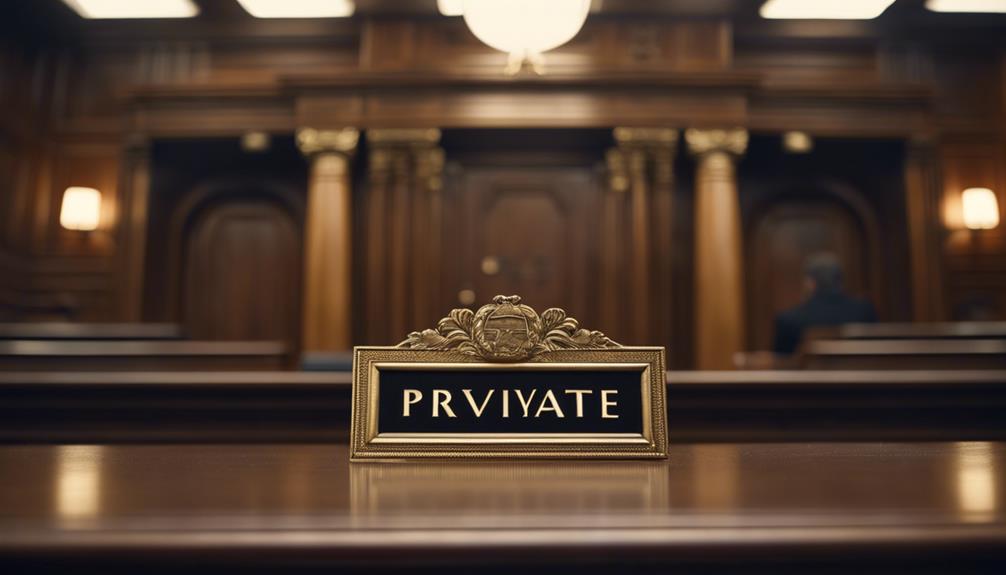Celebrity contract breaches, like Kanye West's canceled concerts or Lindsay Lohan's failed endorsement deals, exemplify the significant financial losses, legal disputes, and reputation damage that can result from broken agreements. Breaches can lead to liquidated damages, penalty clauses, and jurisdictional disputes. Moral concerns shape the legal framework for breaches, and courts consider the extent of the breach and its impact when evaluating damages. Ensuring fair compensation is vital for upholding contracts, and the compensation principle guides the evaluation of damages. As high-stakes cases often involve intense media scrutiny, understanding the implications of contract breaches is essential for mitigating their consequences.
Key Takeaways
• Celebrity contract breaches can result in severe financial losses, legal disputes, and reputation damage, as seen in cases like Kanye West's canceled concerts and Lindsay Lohan's failed endorsement deals.
• Penalties for broken promises are justified by moral concerns, and excessive damages clauses can render contracts invalid, while liquidated damages clauses serve as fair compensation.
• Breaches of contract trigger penalties jurisdiction, and courts consider moral concerns in contractual disputes, ensuring fair outcomes and reasonable damages.
• Fair compensation is crucial for upholding contracts, and the compensation principle ensures accountability, aligning with moral concerns and the penalties rule.
• When celebrities breach contracts, they often face intense media scrutiny, making it essential to consider the impact of penalties on their reputation and finances.
Celebrity Contract Breach Examples
From Kanye West's canceled concerts to Lindsay Lohan's failed endorsement deals, the world of celebrity contract breaches is filled with high-profile examples that highlight the consequences of broken agreements. These breaches can result in severe financial losses, legal disputes, and reputation damage.
For instance, when a famous singer cancels a concert at the last minute, event organizers are left with significant financial losses, which can be compensated for through liquidated damages. Similarly, celebrities who fail to fulfill endorsement deals can face legal disputes and damage to their reputation.
In the film industry, actors who back out of projects after signing contracts can cause production delays and additional costs for the movie studio. These breaches can have long-lasting effects on a celebrity's reputation and career. By examining these high-profile examples, it becomes clear that contract breaches can have severe consequences for all parties involved.
Penalties for Broken Promises

When a celebrity breaches a contract, the consequences can extend beyond financial losses and reputation damage to the area of penalties for broken promises. It's crucial to take care in drafting contractual agreements to avoid disputes and potential penalties. Celebrities, willing to pay a predetermined amount of damages in case of breach, may opt for liquidated damages clauses.
However, penalty clauses that over-compensate for breach of contract are considered invalid. The penalties rule is justified by various moral concerns, including the importance of promises and the principle of compensation.
Some key aspects of penalties for broken promises include:
- A breach of contract must occur to trigger the penalties jurisdiction.
- Liquidated damages clauses are generally enforceable, unlike penalty clauses.
- Penalties for broken promises may involve analyzing the appropriateness of damages in contractual agreements.
- Celebrities should consider penalties well in advance, as they can have a significant impact on their reputation and finances.
Moral Concerns in Contracts

Moral concerns play a significant role in shaping the legal framework surrounding breaches of contract by celebrities, as they influence the interpretation and enforcement of contractual agreements. The penalties rule in contract law, for instance, is justified by moral concerns such as considerations of promise and the compensation principle. This means that over-compensating damages clauses for breach of contract are deemed invalid under the penalties rule, whereas liquidated damages clauses are enforceable.
Breaches of contract by celebrities often raise moral implications, as they involve broken promises and potential harm to others. In contractual disputes, the breach of contract is a fundamental condition for invoking the penalties jurisdiction. Moral implications, thus, play an important role in shaping the legal framework surrounding breaches of contract by celebrities. As a result, courts consider moral concerns when interpreting and enforcing contractual agreements, ensuring that the parties involved are held accountable for their actions.
Proportionate Remedies for Breaches

Celebrities who breach their contracts can face a range of remedies, but the key to a fair outcome lies in guaranteeing that these remedies are proportionate to the breach. This approach guarantees that damages awarded are reasonable and fair, taking into consideration the extent of the breach and its impact on the parties involved. The compensation principle guides the assessment of damages to ensure they reflect the actual losses suffered due to the breach.
To achieve proportionate remedies, courts consider the following factors:
- The extent of the breach and its impact on the parties involved
- The actual losses suffered due to the breach
- The reasonableness of liquidated damages clauses
- The restrictions imposed by the penalties rule to prevent over-compensation
Excessive Damages in Contracts

Excessive damages clauses, which overstep the mark of fair compensation, can render contracts invalid and spark controversy, particularly in high-stakes cases involving celebrities. These clauses, often referred to as 'penalty clauses,' are deemed invalid as they over-compensate for breach of contract. The penalties rule is justified by moral concerns, including the promise and compensation principle, aiming to guarantee that contracts are upheld and respected.
In contrast, liquidated damages clauses, which specify a predetermined amount of damages in case of breach, are enforceable. Breach of contract is a necessary condition for the penalties jurisdiction to come into effect. The impact of excessive damages in contracts can be significant, especially in cases involving celebrities and high-profile individuals. Celebrities, in particular, are often subject to intense media scrutiny, making these cases even more high-stakes.
As a result, it's essential to ensure that contracts are fair, reasonable, and enforceable, without excessive damages clauses that can lead to controversy and disputes.
Fair Compensation for Injuries

To guarantee that contracts are upheld and respected, fair compensation for injuries in contract breaches is vital, as it directly relates to the penalties rule and the compensation principle. This principle ensures that celebrities are held accountable for their actions and that the injured party receives adequate damages. The penalties rule justifies adequate damages clauses that fairly compensate for the harm caused by breach of contract.
In ensuring fair compensation for injuries, the following key aspects come into play:
- Liquidated damages clauses, when reasonable and proportionate, are enforceable and serve as a fair means of compensation for injuries.
- Breach of contract by celebrities must be proven to trigger the penalties jurisdiction for ensuring fair compensation for injuries.
- Ensuring fair compensation for injuries in contract breaches by celebrities aligns with both moral concerns and legal principles related to promises and damages.
- Fair compensation for injuries in contract breaches is crucial to uphold the penalties rule and the compensation principle.
Frequently Asked Questions
What Are the Penalties for Breach of Contract?
Penalties for breach of contract can include liquidated damages clauses that specify a predetermined amount of compensation. These clauses are generally enforceable in cases of contract breach.
In contrast, agreed damages clauses that over-compensate for breach are considered invalid under contract law. The penalties rule is justified by moral concerns, including the principle of promise and the need for fair compensation.
What Are Some Famous Examples of Breach of Contract?
Lindsay Lohan, Kesha, Charlie Sheen, Johnny Depp, and Kim Kardashian are all celebrities who've faced breach of contract lawsuits.
In 2013, Lohan was sued for failing to promote a clothing line.
Kesha faced a lawsuit in 2014 for not delivering albums according to her contract.
Sheen was accused of breach of contract in 2011 due to his behavior on set.
Depp was involved in a dispute in 2017 over his role in the 'Pirates of the Caribbean' franchise.
Kardashian was sued in 2016 for allegedly not promoting a mobile app as required.
What Are the Consequences of Breach of Contract?
When a celebrity breaches a contract, they may face consequences such as paying agreed-upon damages or compensation. These penalties must be reasonable, as over-compensatory penalties are considered invalid.
Breach of contract is a necessary condition for penalties jurisdiction to be invoked, and the penalties rule is justified by moral concerns, including the promise and compensation principles.
What Is the Promise Theory of Contract Law?
The Promise Theory of Contract Law is founded on the notion that contracts are sacred promises that should be kept, emphasizing the moral obligation to fulfill agreements.
This theory focuses on the principle of promise-keeping, arguing that breach of contract results in a moral duty to compensate for the promise broken.
Conclusion
As celebrities continue to break contracts, it's no coincidence that their reputations suffer alongside their bank accounts. Take, for instance, Kanye West's $2.5 million lawsuit settlement for cancelling his Saint Pablo Tour. Similarly, Taylor Swift's 2019 feud with Scooter Braun and Scott Borchetta over master recordings highlights the importance of contractual agreements.
By examining these high-profile cases, it becomes clear that upholding contractual promises is essential, not only financially but also for maintaining a celebrity's credibility and public image.










